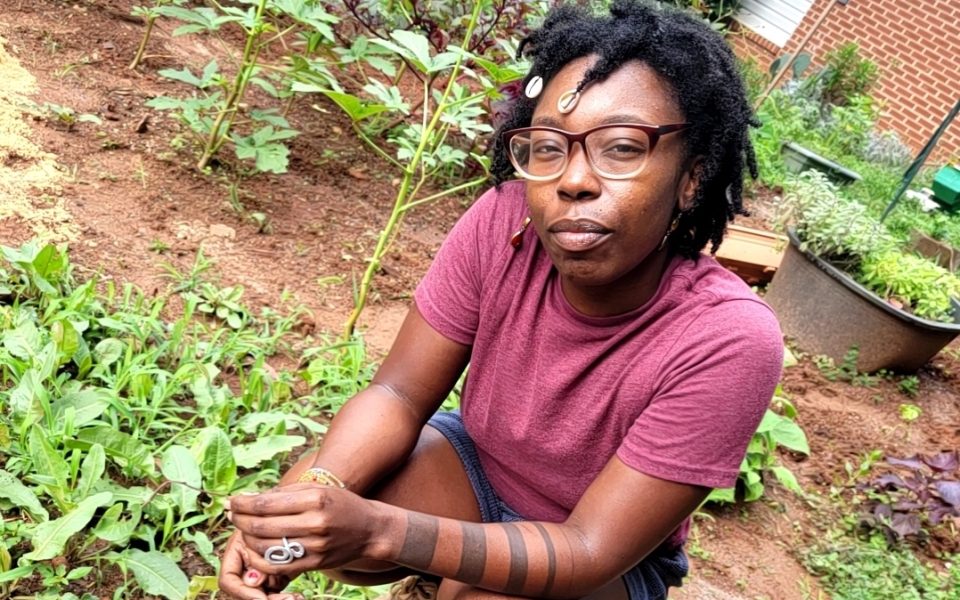by Michael Banner
Featured photo: AnAkha Anet and her husband Michael Banner help run Island CultureZ with Marcus Hill. The organization works to offer fresh food around Winston-Salem.
For many, summertime means easy access to fresh tomatoes, peaches, squash, string beans, cucumbers, butterbeans, watermelons and other goodies. For others, including those living in urban food deserts, access to fresh fruits and vegetables is a luxury. As some sit down to bounty, others make do with dollar-store junk food. But at Island CultureZ, a local nonprofit dedicated to access to healthy food for all in east Winston-Salem and surrounding areas, we’re changing that.
Our organization is supported by WSSU’s Center of Study for Economic Mobility and led by board chairman Marcus Hill and me. Through our urban agricultural efforts, we’ve been withstanding the atomic storms of the COVID-19 pandemic, exacerbated by the systemic poverty and the disadvantageous conditions of East Winston. With participants of all ages, we’re marching on with Grow Winston Grass Root Agricultural Pollinator Herbal Sanctuaries, or GRAPHS. We transformed a lot we leased from the Simon G Atkins CDC into a 30-by-30-foot garden teeming with winter and summer squashes, okra, peppers, eggplant, pole beans and a plethora of herbs and flowers.
With dogged determination, this growth was sustained by laboriously pouring water from a tin pail over the vegetation during the sweltering heat of 2019 and 2020, ultimately yielding hundreds of pounds of produce that was sold at market and through a community-supported agriculture program. We intentionally carried out this effort in the hardest way, just to defy the odds and to show many who have no water hook-ups how to hydrate their gardens.
In 2021, with the threat of COVID still compromising our social interactions, we decided to withdraw much of our volunteering from outlying communities (islands), and hunkered down and devoted more time to our homestead. My wife, AnAkha Anet, partnered with me in establishing our style of “grassroot agriculture” in the front yard of our home, where the moratorium on utilities cutoffs and the city’s rent utilities mortgage assistance program have allowed us to keep our water connected and keep our agriculture sustained. Our top priority heading into the fall season is implementing an irrigation infrastructure that will enable us to grow our budding cooperative.
In other work, we have maintained a constant presence on the Winston-Salem Urban Food Policy Council, making a strong case for the establishment of EBT/SNAP addressing the needs of “the ones who feel it most,” thus increasing market viability at the Liberty Street Farmer’s Market.
While the COVID-19 pandemic increased the supply of produce that flooded the food pantries, we found that much of it was food that was recalled from food chains because of the breakdowns in logistics. So the flooding of give-away food, coupled with other factors, temporarily caused lower demand for locally grown food from our urban farms. But we know the demand will return.
To accommodate that demand, we have plans for a wash-and-pack station so food is ready to be retailed in market spaces or through CSA subscription boxes, thus reducing waste. We are also looking to energize our grassroots agricultural efforts with our schoolchildren and support from WSSU’s Center of Study for Economic Mobility, which we hope will provide interns to work and fellowship with the youth of “the island community.”
As we move forward, we are working to fulfill our mission, “Nurturing Community Wealth Through Unity,” and our vision: a thriving network of synergetic communities, a matrix of “islands,” working in innovative, research-based, community-led ways toward healthy, equitable local economies. We want to create spaces for cultural and economic connectivity, experimentation, implementation and diversity.
We’ll keep working hard for access to healthy food for all.
Michael Banner is the executive director of Island CultureZ.
Join the First Amendment Society, a membership that goes directly to funding TCB‘s newsroom.
We believe that reporting can save the world.
The TCB First Amendment Society recognizes the vital role of a free, unfettered press with a bundling of local experiences designed to build community, and unique engagements with our newsroom that will help you understand, and shape, local journalism’s critical role in uplifting the people in our cities.
All revenue goes directly into the newsroom as reporters’ salaries and freelance commissions.


Leave a Reply